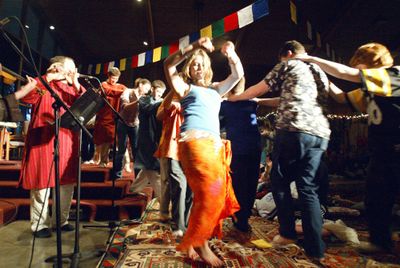Youths don’t trust religions, study says
Young people feel spiritual but not religious

Ian is a Christian who says he is highly spiritual, but not at all religious.
Unfortunately for churches, there are a lot of Ians out there.
A new benchmark survey finds that 55 percent of young people ages 12 to 25 say they are more spiritual now than two years ago. But nearly one-third of them don’t trust organized religion.
“If that’s the way they really feel, it means that we have some serious questions that we need to ask ourselves,” said Terry Dittmer, the director of youth ministry for the Lutheran Church-Missouri Synod.
The survey of 6,853 youths, believed to be the first of its kind, was conducted by the Minneapolis-based Search Institute. Peter Benson and Gene Roehlkepartain, co-directors of the institute’s Center for Spiritual Development in Childhood and Adolescence, said it will take several months, if not years, of serious number-crunching to figure out all of the study’s implications.
Roehlkepartain said the institute hopes to use the data as a baseline for follow-up surveys that will be conducted every two years.
“This is our first coming-out party,” he said.
The survey’s first question was, “What does it mean to be spiritual?” There were nine choices, running from “believing in God” to “being true to one’s inner self.”
Respondents also could say that there is no spiritual dimension, and there was an “I don’t know” option.
The good news for faith communities is that 93 percent of the young people surveyed believe there is a spiritual aspect to life.
But the disconnect between spirituality and religion was clear in the comments from Ian and other young people interviewed for the survey.
Another respondent, Gaurav, said he is “practically religious” in that he follows his Hindu faith’s traditions but he’s not “spiritually religious.”
Amneh has rejected many of her religion’s traditions as sexist but said she still adheres to the teachings of Islam.
Benson said he wasn’t surprised that many young people drew a line between spirituality and religion.
“Spirituality is bigger than religion,” he said. “One of the things we have to focus on now is disentangling spiritual development from religious development.”
Miriam Cameron, a professor at the University of Minnesota’s Center for Spirituality & Healing, said the survey results confirm what she has observed in her classes.
“Many of my students equate religion with dogma and spirituality with harmony,” she said.
But speaking as the daughter of a minister, she said she doesn’t think religions need to feel threatened by the growth of spirituality.
“Not at all,” she said. “Spirituality works well with most religions. The only ones it doesn’t work with are the angry people who say that everyone else’s image of God is wrong. … The spiritual view of God is much more inclusive.”
If the youth don’t feel spiritual in church, where do they?
“Spending time in nature” topped the list of responses. “Listening to or playing music” was No. 2, and “helping other people or the community” was third.
“Attending religious services” was ninth on the list of the 12 most-frequent answers.
Many young people are turning to meditation – so many, in fact, that the Mindfulness Meditation Club at the University of Minnesota soon might be forced to find a bigger space for its weekly introductory yoga classes.
None of the students at a recent class was surprised by the news that spirituality is growing, or by the finding that there’s a line being drawn between that and religion.
“For me, that’s very true,” said junior Jon Delperdang. “I’ve developed a strong belief in the interconnectedness of the world.”
That theory that everything and everyone is part of a larger whole is what sets spirituality off from most religions, senior David Horn said.
“It doesn’t make distinctions, and religion is all about making distinctions,” he said.
Junior Ava Rostampour said her quest for spirituality is fueled by an increase in knowledge.
“As you meet different people, as you are educated in different kinds of cultures, it opens your mind beyond what you were taught as a child,” she said.
So, how do faith communities respond to this trend?
The Center for Spiritual Development stopped short of offering specific advice for how churches can reach more young people, but it did conclude its report with the suggestion that the place to start is with conversations.
The report recommends asking young people open-ended questions, such as “What does being spiritual mean to you?” and “What is most important in your life?”
“We’re not paying enough attention to what our kids are saying,” Roehlkepartain said. “We need to listen more and talk less.”